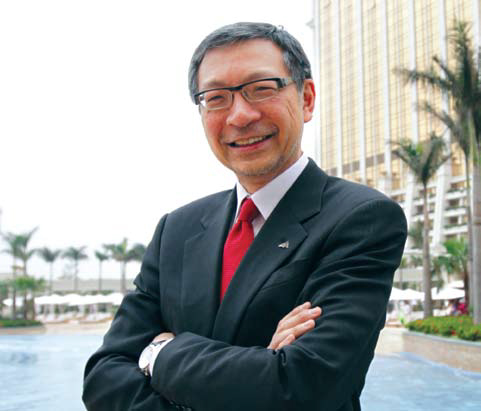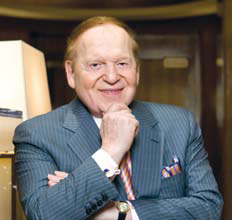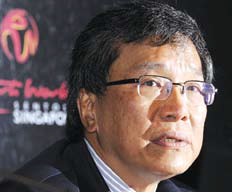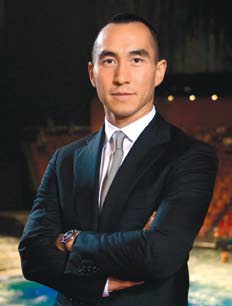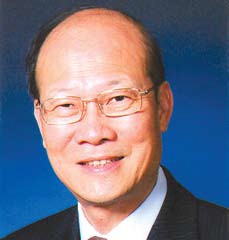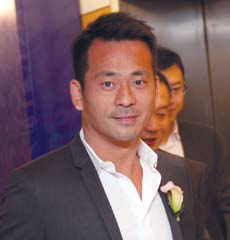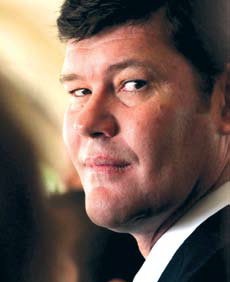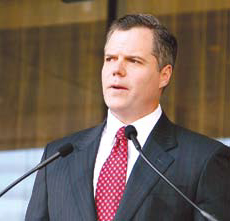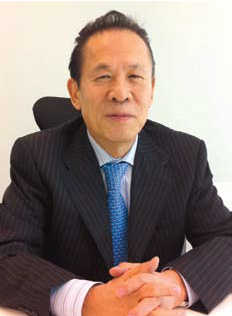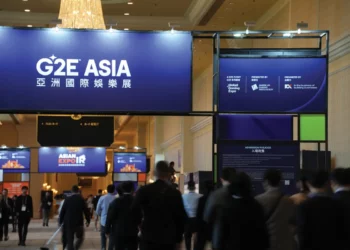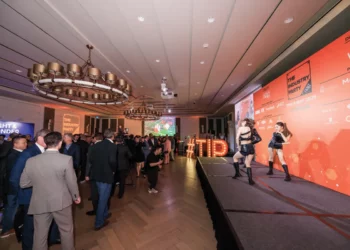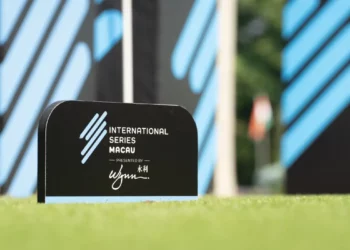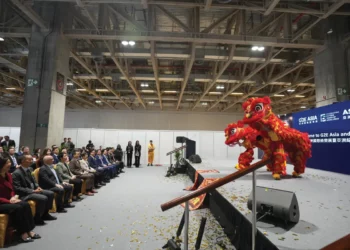1 Francis Lui
Deputy Chairman
Galaxy Entertainment Group
Francis Lui has developed a penchant for working within constraints and exceeding expectations. That is pretty much the defining characteristic of the East Asian economic miracle that began in the 1980s, the beneficiaries of which Mr Lui’s Galaxy Entertainment Group has done an extraordinary job courting in the face of its well-established competitors in Macau.
Mr Lui has a particular affinity for his clientele. A civil and structural engineer by training, he started his career in the late ’70s in the quarries of Hong Kong with his family’s construction materials business, and in 1985 started doing business directly in mainland China.
“If there is a person in Macau who understands what the Chinese customer will look like in the next five or 10 years, it is probably somebody like me, who has been there doing business in China, seeing them evolving,” he says.
When Mr Liu made his maiden foray into the casino industry in July 2004, running operations at the Waldo, a thirdparty- owned venue in Macau—one of the four casinos of the City Clubs brand that Galaxy now operates—he had no gaming experience at all. Waldo was the second new property to open in the city following the end of Stanley Ho’s decades-long monopoly. Two months earlier, Las Vegas Sands Corp had unveiled the glittering Sands Macao, which at opening contained 277 gaming tables and 405 slot machines and featured a crowd-pulling interior design unlike anything the city had ever seen. Waldo, on the other hand, opened with 38 tables and 150 slots, had been hastily converted from an office building, and its most notable feature was the garish neon sign out front. Still, Waldo’s concentration on the VIP market enabled it to out-gross the much-hyped Sands in 2004.
Armed with that experience, Mr Lui unveiled his first flagship, StarWorld Hotel and Casino, in 2006, and it was then that GEG’s brand identity began to emerge.
Owing to the relatively small footprint and limited amenities at the US$436 million StarWorld, that brand-building was until recently largely defined by a strong service mindset and an ability to forge lasting relationships. That changed with the unveiling last May of GEG’s new Cotai flagship, the $1.9 billion Galaxy Macau, which was shaped by the company’s determination not only to “give our customers what they want,” according to Mr Lui, “but also anticipate what they may want in the future. It’s saying, ‘These are our customers over the next five years and asking, ‘What do we need to do in order to keep them coming back to us?’”
Following the Galaxy Macau opening, GEG soared from near the bottom of the revenue-share league table to second place. Only the city’s previous monopoly operator, SJM, has a larger share (inflated by its 14 “satellite” operations from which it derives only a small proportion of earnings). GEG has maintained its position almost consistently over the past 12 months, and that’s no small feat for a company that has only eight years’ operating experience to pit against international stalwarts such as LVS, Wynn Resorts and MGM Resorts International.
More than market share, however, Mr Lui cares about capital efficiency. “When I started the business here, people asked me, ‘What do you use to measure your performance?’” he says. “At that time, a lot of people assumed market share or revenue or EBITDA or EBITDA margin. But I always said, ‘No, it should be based on ROI—return on investment.’”
Galaxy has delivered consistent returns and punched above its weight in terms of capital efficiency by showing that it really understands its players and junket partners, cares about them and wants their repeat business. Success in VIP gaming has been the cornerstone of GEG’s success. If you speak privately to those in the junket trade—which currently delivers about 70% of Macau’s gross gaming revenue—they will tell you that the support provided by Galaxy is second to none.
Then there’s the corporate culture. Mr Lui has been able to assemble an executive team that’s not only good at what it does but seems to be happy in the job and isn’t afraid to connect with staff on the floor. Walk through one of Galaxy’s properties and you frequently see top executives making the rounds—more often than not with smiles on their faces, a rare sight among senior staff in this business. It’s no wonder that many Macau locals view GEG as the city’s preferred employer—a company that will treat them well and afford them the opportunity to grow and make an impact.
It begins with the humility that Mr Lui himself conveys and which stands as a key component of GEG’s success in a part of the world where personal relationships and social and familial networks are paramount in facilitating business and other dealings.
“Galaxy and I came into the industry from very humble beginnings,” he says. “I had a clean slate. So I came with Asian heart, I came here to learn, respect other people and see what I can do to integrate all the lessons I learnt into my own creation.”
It’s why people in the region—including players from China, Hong Kong and beyond, the junkets, the residents and government of Macau and the central government in Beijing—like Mr Lui and GEG and want to see them do well. And partly why when China’s 2012 Olympic gold medalists were on a two-night stop in Macau last month, they opted to book their stay as paying guests at Galaxy Macau.
Most important, Mr Lui has the company well-positioned for future development with the biggest land bank on Cotai at 2 million square meters. It is currently building Phase 2 of Galaxy Macau—scheduled for completion in mid-2015—which looks set to become the first new property of Cotai’s much anticipated “second wave” of resort development.
If GEG continues developing its mass market business at its current pace, following the Phase 2 opening the company stands a good chance of becoming, by every measure, the No. 1 operator in the largest casino market in the world.
2 Sheldon Adelson
Chairman and CEO
Las Vegas Sands Corp
It’s not merely casinos that Sheldon Adelson has built over the last decade, it’s more even than a multinational resort business—it’s an “economic machine,” as one of his top executives describes it.
As for the gruff, diminutive maverick at its controls, unabashed capitalist, implacable foe of trade unions, militant Zionist, a billionaire 25 times over, iconoclast to the end, his body’s been slowed by age (he turned 79 in August) and infirmity, but the will that centered an empire on the pillars of the three most lucrative gambling markets in the world, two of which he largely created, it’s indomitable as ever.
He’s got people on two continents suing his companies for tens of millions of dollars, claiming they were cheated or misused. The US Justice Department, the FBI, the US Securities & Exchange Commission and the Nevada Gaming Control Board are investigating his business dealings in China and Las Vegas amid allegations rife with tales of bribery, corruption, money laundering, blackmail and prostitution. No less a voice than The New York Times’ has basically called for his banishment from the US political process. Even Macau’s normally quiescent authorities have gotten into the act, looking into possible violations of its anti-privacy laws.
But if Mr Adelson is feeling encircled these days, it’s not like he hasn’t felt that way before.
Born in the Great Depression, one of four children of an immigrant taxi driver and ad salesman, he has known privation. As he remarked after having watched 90% of his fortune evaporate in the 2008 global financial crisis—“So I lost $25 billion. I started out with zero.” In the relative calm of more recent times, he has maintained that to the “entrepreneur” there is “no such thing as fear. Concern, yes, Fear, no.” And he has battled back from the corporate ruin that confronted him four years ago to rank eighth on Forbes’ 2012 list of the wealthiest Americans, 14th in the world, the head of a company forecast to book more than US$12 billion in revenues this year and commanding an enterprise value north of $40 billion.
His drive still wears out men half his age. He’s got an eye on Vietnam and South Korea. He’s kicking tires in New York City and Toronto. Officials in Japan are soliciting his thoughts on resort development there. In Spain, his multibillion-dollar EuroVegas scheme has Madrid and Barcelona competing for his favors as they’ve never fought on the football pitch.
He’s finally a second in command he trusts, and stable, capable management in place in his core Asian markets. The global growth strategy has been fine-tuned. A minimum of 25-35% of new developments are to be funded with equity, with 65- 75% of financing in place before any earth gets moved. No less than a 20% return on invested capital is acceptable.
As for the “machine,” it cranks on like a force of nature, fueled by its own massive asset base, 90% of its pre-tax earnings generated by its four Macau casinos—the city’s largest in terms of hotel rooms and square footage and the market leader in high-margin mass play—and Marina Bay Sands in Singapore, the most expensive and arguably the most profitable gambling resort in the world.
Nor does it appear that his legal troubles have cost him a beat in either place.
But then, LVS has invested more than US$9 billion in Macau, and its $5 billion Sands China subsidiary, a Hang Seng blue chip less than three years after listing, straddles the territory like a state within a state, entertaining more than 100,000 tourists a day, employing more than 20,000 people, 80% of them locals, and generating one-fifth of the city’s gaming taxes.
He has vowed to bring down the president of the United States, whatever it costs, and sure enough, there was Republican Mitt Romney at the end of July, millionaire Mormon, seated next to the Jewish casino magnate at a fundraiser in Jerusalem, and early in August, there was Congressman Paul Ryan, who didn’t wait a week after being named Romney’s running mate to make the pilgrimage to Las Vegas to render fealty to the cabdriver’s son.
What does the man himself make of it all? It would be interesting to know. “A billion here, a billion there,” as he likes to quip, “pretty soon you’re talking about real money.”
Maybe therein lies the answer.
3 Lim Kok Thay
Executive Chairman and CEO
Genting Berhad
While the fortunes of Resorts World Genting in Malaysia—the country’s only casino—continue to rise and fall with Malaysia’s changing political climate, Lim Kok Thay’s company has dealt with the risk by diversifying far and away from its native shores.
Genting’s New York casino at Aqueduct Racetrack in Queens looks to be going from strength to strength. In July it posted a record US$1.13 billion in total bets, which resulted in record revenue of $59.75 million. The “racino”—as it is known due to its racetrack location—is the only one in America’s biggest city and is pulling in gamblers from across the heavily populated metropolitan region, despite its lack of table games.
In Manila Genting’s joint venture with Alliance Global Group—Travellers International Hotel Group—has announced that it will open its second casino in the city in 2016. The US$1.1 billion Resorts World Bayshore development will make Travellers— and Genting by extension—by far the largest casino operator in the Philippines.
And Lim Kok Thay also looks well positioned to play kingmaker in the battle for Australia’s Echo Entertainment, owners of The Star casino in Sydney and Jupiters on the Gold Coast. James Packer has made it clear that he is aiming to boost his shareholding to 25% and seize control. But Genting is also waiting for regulatory approval to go from 10% to 25%. He could cozy up to Packer or he could go it alone, but either way, Mr Lim is playing an influential role far from the tropical shores of his home country.
But it isn’t all rosy. Genting’s plans elsewhere in the United States appear to have taken a knock. It failed to receive legislative approval for a resort casino in Miami Beach and has been forced to downsize its plans there to two condo towers and a hotel with fewer than 500 rooms, or about one-tenth of its original size.
Alongside the disappointment in Miami, Genting announced a luxury boutique casino on Bimini Island in the Bahamas. The casino will be the only one on the island, which is 48 nautical miles from the coast of south Florida, but plans for a US$24 million refurbishment of the 5-year-old site are a far cry from the $3.8 billion megaresort the company was planning to build nearby Miami.
And its operations in the world’s most profitable casino market, Singapore, have taken a slight hit of late. Higher expenses and lower gaming revenues caused Genting Singapore’s net profit to dip by 32% year on year in the second quarter to S$165.5 million (US$132.5 million).
On the other hand, if regulators in the city-state approve further amendments to the Casino Control Act to deter Singaporeans from gambling at its two integrated resorts, Asian Gaming 50 – 2012 Genting stands to benefit more than rival Las Vegas Sands Corp due to the proximity of Genting Highlands to the Lion City.
But regulatory risks notwithstanding, the company’s cash position and its global reach put it at the very top of casino operators around the world, and much of its success is attributable to the capable hands of Mr Lim.
“Just on a global basis their scope and reach is far greater than any other casino company,” says one Singapore-based gaming analyst.
The company is also believed to be looking at opportunities in the North Asian markets of Mongolia, South Korea, Japan and Russia’s Pacific coast.
Mr Lim, 60, son of Genting founder Lim Goh Tong, joined the company in 1976 and has been a director since 1986. He became chairman in 1993 and executive chairman in 2005. He is also the co-founder of Genting Hong Kong, which is the third-largest cruise operator in the world.
4 Lawrence Ho
Co-Chairman and CEO
Melco Crown Entertainment
Lawrence Ho is leading Melco Crown Entertainment toward regional expansion after having completed a significant localization of the company’s top management.
On 5th July, the company entered into a memorandum of understanding with Belle Corp, controlled by the Philippines’ richest man, Henry Sy, to form a consortium that will own and operate the US$1 billion Belle Grande Manila Bay resort, scheduled to open next year at the Entertainment City resort
complex in the Philippines capital. Melco Crown’s is investing $580 million in the project, which will include 880 hotel rooms, 350 table games and 1,900 slots.
There is speculation that Mr Ho’s company could also be gearing up to bid for a project in a new gaming and entertainment zone near Vladivostok, Russia—the Integrated Entertainment Zone of Primorye. Nash Dom Primorye, a state-owned company that will manage the zone, issued a request for concepts in July, inviting gaming operators to submit ideas for the first phase of the zone’s development and offering attractive leases and a near zero gaming tax rate. Melco Crown Entertainment Executive Director Frank Tsui and Director of Business Development Stephanie Wong have already traveled to the zone to meet with top management of Nash Dom Primorye.
Mr Ho also plans to expand in Macau, on Cotai, with Macau Studio City. The long delayed resort had been held back for years by a dispute between some of its former partners, whom Melco Crown bought out last June in exchange for a 60% stake. Plans call for 300-400 gaming tables and 1,200
gaming machines, although, critically, the casino portion of the resort has yet to be approved. The prevailing sentiment is that it will be. The company, in the meantime, has received approval to resume work on the site’s pilings and foundation.
Melco Crown is also evaluating the next phase of its development plans at City of Dreams, including possibly a new hotel or luxury residences.
Those plans will be aided by its improved liquidity and access to new capital following its secondary listing on the Hong Kong Stock Exchange in December. (The company has been listed on NASDAQ since 2006.)
As for the localization of management, it marks a distinct turnaround from the early days of the joint venture between Mr Ho’s Melco and Australia’s Crown Ltd. Initially, a lot of the senior appointments were former Crown executives from the Australian side of the JV. This probably made sense at the time because of Crown’s extensive experience with running gaming operations in its home market. The early placements included Simon Dewhurst as CFO and Greg Hawkins as president of City of Dreams. Gradually, however, as Mr Ho found his stride and felt out the market, the Crown managers have been going back home, and senior management has become decidedly Chinese.
The company has held largely steady as the expats have left, most recently with the departure in February of co- COO Nick Naples (formerly of Harrah’s Entertainment), leaving Ted Chan in control as sole COO. Although total second quarter revenue was down 2% year on year to US$939 million and adjusted EBITDA fell 6% to $204 million, the decline was largely the result of a poor performance at the VIP-focused Altira on Taipa, which suffers both from its relative isolation from the critical mass of properties on Cotai and the Macau peninsula as well as the overall weakness in the VIP market in the quarter. VIP gaming volumes at Altira were down 23% year on year in the second quarter, with property-level net revenues down 33% to $209 million. Meanwhile, property level net revenues at the flagship City of Dreams rose 13% to $684 million.
While Altira is likely to continue to be a drag on earnings, this would have happened regardless of localization, and the company’s bottom line will be boosted in coming quarters by continued strength in the mass market, especially as the action shifts inexorably to Cotai, benefiting City of Dreams.
5 Steve Wynn
Chairman and CEO
Wynn Resorts
At 70, Steve Wynn is at the point where the thoughts of extraordinarily successful men tend to gravitate to their legacies, and the man behind The Mirage, Treasure Island, Bellagio, Wynn, Encore and Wynn Macau intends his resort on Cotai to be his magnum opus.
He calls it “the single most important project in the company’s history”—and that’s not hype, not at the US$3.5 billion-$4 billion price tag it’s carrying.
He has waited a long time to show what he can do at the booming entertainment district that will be China’s answer to the Las Vegas Strip he largely helped shape. He and his design team at parent Wynn Resorts have spent more than two years on the drawings, the result being a destination that “represents everything we’ve learned,” as he puts it, which is quite a lot, as we know.
They’ve been two years well spent, to hear him tell it. “Even when we came to Macau, we resisted the temptation to build a quickie, smaller place, to get in on it fast,” he told the media that had gathered for the Cotai unveiling back in June. “We waited and we took our time. I think that that is exactly the way to go forward in China— very thoughtfully, very patiently, with great attention to detail.”
Those were the attributes that preceded Mr Wynn to Macau in 2002, when such was his renown, his was the only non-Chinese company to win one of the new casino concessions.
And they precisely describe what he has accomplished in the city to date.
It was interesting to hear him at that press conference refer to Wynn Resorts, a company with an enterprise value exceeding US$13 billion, as a “niche” operator. Yet it’s an apt description for what he’s done over the last decade in this, his third publicly traded incarnation, which has been to boldly pursue the top end of the market on two continents, and he’s captured his share in both. He took four years and $1.2 billion to erect Macau’s only Mobil Five Star hotel (one of only five in Asia) and invest it with an elegance that still stands out in a marketplace that has seen no shortage of capital investment since. It’s a rare art in the casino space. Steve Wynn is an acknowledged master. It shows in the cocoa-colored replica of his iconic Strip hotel with its sweeping curves, in the choreographed drama of the water show that beckons you from the street, the circular interiors, the lush, tropical courtyard, the objects d’art—ceramics, decorative metalwork and silks—highlighted by matching four-foot-tall Qing Dynasty vases. Wynn Macau exists to reassure its wealthy clientele of their discriminating taste and make the rest of us feel that we’re part of something special, too, and we do.
It’s why the place generated US$186 million just from its shops last year and is on a pace to surpass that in a decidedly more challenging 2012. It’s why both average daily room rate, and occupancy rate, are higher through the first half of this year than last. Earnings were up a robust 82% in the second quarter, despite weakness on the gaming side.
But then Mr Wynn has spent more than 40 years in Las Vegas and Atlantic City, the toughest markets in the world, honing an operating savvy that is as legendary as his eye for design.
Wynn Macau managed to grow rolling chip volume 3% through a difficult first half to rank fourth in the market (as of 30th June) in average daily volume per table. Only City of Dreams exceeded it in main-floor win per table among properties with comparable numbers of tables. And in both categories Wynn Macau exceeded the citywide averages. Average daily win of US$795 per slot machine was the highest in the market by far, twice the average on Cotai.
Add it all up and it explains why Wynn Macau trades at the second-highest EV/ EBITDA multiple in town (after Sands China), and only Sands, with earnings from four properties, enjoys a higher market capitalization.
What Mr Wynn will achieve on his 51 acres on Cotai remains to be seen, of course. But he’ll have a lot more space to work with, twice as many hotel rooms, plus an entertainment arena, and his will be the closest property to the airport and the new Taipa ferry terminal. The rail line from Guangzhou will pass right in front, where there will be a lake and an even more elaborate water show and air-conditioned gondolas waiting to carry visitors on a tour of the place from above.
6 Ambrose So
Executive Director and CEO
SJM Holdings
Since Stanley Ho’s retirement from SJM Holdings, the listed parent of the casino empire he founded, it’s been Ambrose So, the great man’s successor as chief executive, who has exercised operational command of Macau’s most prolific money-making machine, a responsibility he has fulfilled with quiet effectiveness.
Though expansion at the burgeoning Cotai resort district has chipped away at SJM’s historical dominance of the market, total results for the group last year – consisting of four self-promoted casinos, three machine gaming venues and 14 third-party-promoted “satellite” casinos – included a 42.5% increase in adjusted EBITDA to HK6.92 billion (US$887.6 million) on a 32% rise in gaming revenue to HK$75.51 billion (US$9.68 billion). VIP trade, long the company’s strong suit, accounted for an even larger share of the business than it had in 2010. The company’s flagship, the Grand Lisboa, delivered a 57.7% increase in rolling chip volume and HK$5.6 billion more in VIP revenue than in 2010. And the mass market was superbly managed. Table revenue on the main floor was up 39%, and slots were up 23.5%, contributing to a solid 16.5% operating margin. The other self promoted casinos, Casino Oceanus, Casino Jai Alai and the venerable Casino Lisboa, were similarly strong in high-margin mass play, delivering 10 cents of every dollar of combined revenue to the EBITDA line, which was up year on year almost 40%.
Under Dr So’s leadership, the company has continued that strong performance into this year. SJM concluded the first half with a 27% share of the market’s total gaming revenues, down from 2011’s 29%, but Grand Lisboa outperformed the market as a whole, growing gaming revenue 22% on continued strong gains in table revenues, particularly on the VIP side.
There will be no lack of challenges for the CEO in the months ahead, with growth expected to slow throughout the market and the operating environment certain to become even more competitive.
But by virtue of the association he has enjoyed with Stanley Ho, which stretches back decades, the 61-year-old draws from a unique and very deep well of experience. He joined the tycoon’s casino monopoly in 1976, three years out of the University of Hong Kong, and served as an executive director of Dr Ho’s Shun Tak conglomerate for 18 years. He has been a director and senior manager at Sociedade de Jogos de Macau, SJM Holdings’ casino operating arm, since its inception when the monopoly expired in 2002. In 2006, he was named a director of SJM Holdings and would be instrumental in guiding it to a successful listing in Hong Kong.
And as its second-largest individual shareholder and the chairman of its Executive, Nominating and Remuneration committees, no one exerts a greater influence on its strategic direction—and there is perhaps no one whose outside connections are more extensive.
Dr So is a director of Stanley Ho’s Estoril Sol, the listed holding company for Portugal’s largest portfolio of casinos (which includes Europe’s largest, Casino Estoril). Regionally, his interests extend to companies engaged in consumer electronics and finance. He also sits on the boards of two SJM-affiliated construction and real estate investment companies.
And like his former boss, he moves in the highest circles of the government of the SAR, serving as chairman of the city’s port authority and a member of the Economic Development Council, and providing Macau with a respected voice among the powers that be in Beijing. He is a member of the National Committee of the Chinese People’s Political Consultative Committee and serves as a consultant with the Beijing Municipal Committee of the CPCC on its relations with Macau, Hong Kong, Taiwan and the greater Chinese diaspora.
Interestingly enough, none of this has guaranteed SJM a front-row seat on the unfolding spectacle on Cotai. Instead, as four of the five competing concessionaires move forward with land approvals for the next round of resort projects there, SJM’s vantage has been limited to the gallery. That may have been by choice. The company says it is in “advanced” discussions with the government on its application for a 70,400-square-meter site in the district, and it entered the second half of the year with US$2.74 billion in cash and bank deposits and one of the cleanest balance sheets in the business.
What is certain is that no operator knows the Chinese mindset and the mentality of the Chinese gambler better than SJM, and Dr So has been diligent about biding his time and ensuring his company is in a strong position to exploit the opportunities whenever and wherever they arise.
7 Alvin Chau
Chairman
Suncity Group
Even Macau’s other major junkets acknowledge that Suncity Group is probably the largest operator among them and also by far the most innovative, not only in its core business but also in pursuing other opportunities, from media and entertainment to IT solutions.
Alvin Chau and his Suncity Group—which was only set up in 2007—have experienced a meteoric rise. Suncity runs 14 VIP clubs with around 230 tables. The group also runs two high-roller operations overseas—at Paradise Walkerhill casino in South Korea and a resort in Cagayan Province in the Philippines—and has representative offices in Japan, Thailand and Taiwan.
Suncity’s rapid expansion is aided by the youth and vigor of 38-year-old Mr Chau. Despite the group’s undiminished appetite for growth, however, Mr Chau emphasizes that they remain prudent, putting themselves in a safe position during the current slowdown in VIP growth in Macau, in contrast to other groups that have been more aggressive in extending credit and may find bad debts coming home to roost in the coming months. Mr Chau attributes the slowdown to global economic conditions but believes Macau’s VIP segment should easily see itself back on track by next year.
Suncity strives to distinguish itself from its junket rivals by providing its clients the most complete and highest-quality range of supporting amenities and services, and to that end has invested heavily in businesses outside the gaming realm. In 2008, the group established Sun City Tours, which offers comprehensive travel agency services in Macau. Suncity also owns chic entertainment venues, including Club Lotus nightclub at The Venetian Macao and SKY 21 Bar and Restaurant atop AIA Tower, offering panoramic views from one of the trendiest hangouts on the Macau peninsula. The group also recently unveiled an über-exclusive boutique called SKYLuxe within SKY 21, offering a collection of limited-edition and one-of-a-kind timepieces, jewelry and fashion accessories.
Suncity also promotes its brand heavily by sponsoring big-name concerts and live performances. Among the highlights over the past year were the four-day sold-out Jacky Cheung “1/2 Century Tour” in Macau, Taiwanese magician Lu Chen’s performance at The Venetian’s Cotai Arena and Sita Chan’s “Crazy Love” concert in Hong Kong.
The group’s media vehicles often directly bolster its gaming and tourism businesses. The movie “Poker King,” starring A-list Hong Kong actors Louis Koo and Lau Ching Wan, was produced to support Suncity’s efforts to develop poker’s following among baccarat focused Chinese players. High rollers at Suncity’s Poker King Club at Galaxy StarWorld Hotel and Casino now play for the biggest pots in the world. Suncity’s poker effort is also supported by its Poker King magazine, while e.traveller magazine and UO Macau— the leading Web site for Chinese visitors to Macau—help drive visitors not only into Suncity’s arms but also to Macau as a whole.
Although many of Mr Chau’s non-gaming investments are intended to bolster Suncity’s core activities, others have larger standalone aspirations. Sun Entertainment Group, set up in 2008, has financed and produced a string of big-budget films, including the blockbuster comedy “Vulgaria,” starring Chapman To and Ronald Cheng.
One of the group’s greatest innovations in securing the loyalty of its customers is the Suncity Card, which not only offers redemption of points for retail, dining and entertainment purchases around Macau but also delivers discounts and other privileges. By swiping their cards at one of several conveniently located Suncity BTM Card kiosks, members can also access detailed records of their gaming activities and other spending and credit amounts they are entitled to at specific venues. Members can also avail themselves of an exclusive 24-hour concierge service. .
Mr Chau continues to expand the brand with acquisitions in finance, media and health and beauty across Hong Kong, Macau and China and other interests that include the development, marketing and production of software and an iron mine in Indonesia.
He vows to keep on innovating and evolving to maintain Suncity’s edge over its rivals and contribute to Macau’s transformation into the entertainment capital of Asia.
8 James Packer
Executive Chairman, Crown Ltd
Co-Chairman,
Melco Crown Entertainment
Finding himself at 38 the custodian of one of the world’s great fortunes, James Packer was perhaps too aggressive in his desire to impose his personality on the extensive gaming and media holdings his father, Kerry, left him with his death in 2005. It was as though he needed to prove himself worthy of the daunting legacy of Australia’s richest and most influential man, and assert his independence of it at the same time, and he stumbled badly.
The missteps were mostly in Las Vegas, most of them in 2007, just as the bottom was about to fall out. In his defense, he was far from alone in missing the storm gathering on the horizon, and certainly he wasn’t the only one to spit directly into it, spending lavishly in a failed bid to establish Crown as a leader in the neon mecca and burning through more than US$1 billion before it was over.
To all appearances the American odyssey left him with nothing but a quarter interest in some suburban venues in Vegas’ recession-battered locals market and a racino in the US state of Pennsylvania near the city of Pittsburgh. But that would be a serious misreading as well. The losses were an invaluable experience. Kerry Packer didn’t believe in higher education and refused to send his only son to university. Failure compensated for the schooling he lacked. Its lessons haven’t been lost on him.
Now 45, he has learned that there are partners and then there are partners, and he’s been deftly exploiting the difference ever since. Through Melco
Crown Entertainment in Macau he enjoys a 33.4% stake in more than 600,000 square feet of total resort space in the largest casino market in the world, with another 1.2 million square feet under development at Studio City. The joint venture also has invested in operational control of the US$1 billion Belle Grande Manila Bay resort in the Philippines capital. With Crown’s 50% of Betfair Australasia, he’s got a tidy share of the world’s largest betting exchange and one of the great innovators in the online sector.
He’s established his credentials as a solid operator as well, hiring and retaining strong management at Crown’s casinos in Melbourne and Perth, which has enabled the properties to grow amid increasing regional competition and the most difficult market conditions the Australian industry has faced. Likewise in Macau, he’s wisely deferred to the Chinese brain trust at Melco Crown to steer his investment there to increasing profitability.
And he’s reinvested heavily in his core holdings, funding a six-year, A$2.2 billion capital expenditure program at Crown Melbourne and Burswood in Perth that will ensure they remain among the best-appointed and most attractive resorts in the industry.
In steadily exiting the “old media” holdings he inherited to focus on gaming, he continues to exhibit vision and single mindedness of purpose. He amassed more than A$4 billion in 2006 by selling off half the family flagship, Publishing and Broadcasting Ltd, and spinning off Crown as a publicly listed pure-play casino operator, the largest in Australia. He stands to realize another $1 billion once a pending sale of his remaining media interests is completed—fattening a bankroll he’s using to extend his reach into Sydney through a decisive stake in rival Echo Entertainment and a planned luxury resort at the Barangaroo complex at Sydney Harbour that will be a game-changer for the country’s largest city.
The truth about James Packer is that he sees more for gaming Down Under than it sees for itself. He understands that if a market isn’t growing, invariably it must contract as newer and more innovative competitors sweep up the opportunities. He recognizes that Echo, Sydney’s monopoly operator, holds the key—and not only to Barangaroo, which needs Echo’s license, but to the possibility of a Crown-Echo partnership aimed at cornering a greater share of Asia’s lucrative VIP trade and restoring the Australian industry to a leadership position in the region.
As Echo’s largest individual shareholder he’s in a unique position to apply the combination of persuasion and force needed to make this happen. But this isn’t the youthful aggressor of 2007. He’s learned, as his father knew so well, that hardball is an art both brutal and subtle.
9 James Murren
Chairman and CEO
MGM Resorts International
Jim Murren knows Wall Street and the Street knows Mr Murren. The ex- Deutsche Bank managing director knows how investors and bondholders think, and they like him, and they trust him all the more for it. That intimacy, backed by no small measure of financial acumen, proved critical to keeping debt-laden MGM Resorts International afloat during the 2008-09 global credit crisis, when it was struggling to open CityCenter and its very survival hung in the balance. It continues to drive the big ship forward through a stubbornly persistent US recession.
It’s also served him well in Macau.
Mr Murren’s hand was evident last May when the IPO for MGM China Holdings went off on the Hong Kong Stock Exchange at the top of its prospective range, garnering US$1.5 billion. His influence was there in the capital restructuring with partner Pansy Ho that landed MGM Resorts 51% of MGM China with a US$3.5 billion accounting gain on the books and operational control of the new company’s prime asset, the casino at MGM Macau and its 430 table games, 1,200 slot machines and 580 hotel rooms and suites.
That control has been the key to MGM Macau’s ability to hold its own as a single property operation in an increasingly competitive, increasingly multi-store marketplace, and it means China’s indefatigable gamblers will continue doing their part to bulk up the parent company’s income statement back home and maintain the viability of its heavily stressed balance sheet.
Within weeks of taking charge in Macau, MGM’s management got to work improving the casino’s presence in the VIP sector, signing on new junket partners and converting a number of luxury villas and spa areas into gaming rooms, moves that netted the property 63 additional VIP tables. By the end of 2011, rolling chip turnover was up 72%, and gross VIP win had nearly doubled, contributing to a 65% increase in total casino revenues and bringing HK$3.28 billion (US$420.5 million) to the bottom line.
Sustaining those gains has been challenging in this year’s noticeably cooler market, but operations have remained solid, and the positive impact of that in terms of EBITDA (counted since the restructuring as part of MGM Resorts’ consolidated returns) has been enormous.
Consider that of the US$567 million the company’s 17 casinos generated in operating income through the first half of this year, 28% of it came from one of them, MGM Macau, which accounted for an incredible 71% of all the cash generated by operating activities. Since MGM China’s listing last June, the Macau operation has delivered more than 38% of MGM Resorts’ consolidated cash flow, an amount exceeding $658 million.
There is no way to overstate what this has meant to Mr Murren’s ongoing efforts to deal with the company’s US$13 billion-plus of long-term debt, $997 million of which is due to mature within the next 12 months, not counting $1 billion in interest payments due over the same period as the debt is currently structured.
This herculean task has consumed the better part of his four years at the helm. To his credit, though, he’s displayed more than financial wizardry over this time. His strengths as a strategic thinker have kept the company as innovative and opportunistic as it is big.
Its MGM Hospitality arm has progressed from vision to reality in the form of a new luxury resort on China’s Hainan Island and the scheduled opening early next year of MGM Grand Ho Tram on Vietnam’s South China Sea coast. MGM Grand, Bellagio and SkyLofts hotels are planned or in various stages of development in North Africa, in Dubai and Abu Dhabi and in India, and a number of five-star properties are being mapped in cities across China in partnership with the renowned Diaoyutai State Guesthouse.
In North America, Murren & Co have been first on the ground in Toronto, which is considering hosting a resort-scale casino, they appear to have the pole position for a casino in the US state of Maryland, and they’ve submitted plans for a resort casino in Massachusetts.
They’ve been no less ambitious in pursuing a stake in Macau’s burgeoning Cotai resort district, where MGM China has applied for permission to develop 17 acres into a 1,600-room luxury hotel with 500 table games and 2,500 slots, a three-year project priced at US$2.56 billion.
10 Kazuo Okada
Chairman
Universal Entertainment Corp
Kazuo Okada is playing for very high stakes in developing a casino project in the Philippines. As The Wall Street Journal noted recently, “Success would make him a formidable player in the Asian casino market.… But failure would pummel his company, Universal Entertainment Corp, which already has put US$500 million, equivalent to some nine years of earnings, into the Philippines project.”
Manila Bay Resorts, the US$2 billion complex being developed by Tiger Resorts Leisure and Entertainment Inc, a subsidiary of Universal Entertainment, broke ground on 26th January and is slated to open in 2014—requiring Mr Okada to soon pump at least $1 billion more into the project—and is expected to include 500 gaming tables, 3,000 slots, 2,000 hotel rooms, various entertainment facilities and the world’s largest oceanarium.
Mr Okada’s decision to pursue it has also lost him his longtime friend and partner, Steve Wynn. Mr Okada had originally wanted to develop the project together with Mr Wynn, and the pair had traveled to the Philippines in 2010 to explore the possibility of making an investment there, but Mr Wynn and his company’s board balked, concerned aboutthe Philippines’ reputation for corruption.
Mr Okada, who made his fortune the hard way, via the tough, competitive— and in the past murky—world of Japan’s pachinko machine manufacturing, is known for following his own gut instincts. He chose to ignore the concerns of his partner and go it alone in the Philippines, setting off on a path to becoming a competitor to Wynn Macau in luring wealthy Chinese gamblers. This sparked a bitter feud involving lawsuits, countersuits, corruption accusations, insults, the ouster of Mr Okada from the board of Wynn Macau, and the forced redemption of his shares in parent company Wynn Resorts (which accounted for the largest single holding in the company at around 20%) at a steep discount and payable over 10 years— one of the many issues Mr Okada is currently contesting in court.
Although one could question whether Mr Okada may have lost too much in going ahead in the Philippines, it could be a reasonable gambit if his ultimate goal is to get his hands on one of the proposed integrated resort licenses in Japan that many think will soon be approved after nearly two decades of debate.
Considering the grey-area pachinko industry in Japan brings in roughly US$27 billion per year, a legal casino industry in the country could easily eclipse most of the world’s gaming destinations. At one time it seemed as though Mr Okada was Mr Wynn’s meal ticket in Japan if that happy and much talked about day of casino liberalization ever dawned. It now appears Mr Okada is ttempting to position himself to savor that meal himself.
Although Steve Wynn and Sheldon Adelson have legitimate grounds for their aversion to getting involved in the Philippines, they have proven track records for developing internationally renowned casino resorts, while Mr Okada has only provided financial backing. Although his Manila Bay project offers uncertain returns, it is an opportunity to prove he is equally capable of building and operating an impressive IR.
In addition to Manila Bay Resorts, he is busily working to create a gaming and entertainment empire across Asia under his Universal Entertainment brand. Ranked by Forbes as the 17th wealthiest person in Japan with a net worth of US$1.8 billion as of March this year, he announced numerous new ventures and investments in the first half of 2012. He met with officials in South Korea in June and pledged to contribute 60% of the budget for a proposed US$4.21 billion integrated resort in the city of Incheon. He also opened three high-end restaurants in Hong Kong and is looking to open more in Shanghai and Japan.
As proof of his acumen in serving casino players, his gaming machine development unit, Aruze Gaming America, which he took private in 2009, has leveraged his decades of insight into player behavior and player preferences from the pachinko market to create some of the most sought-after games on casino floors around the world.
If Mr Okada pulls off his projects in the Philippines and South Korea and goes on to secure rights to develop a casino resort in his homeland, his current courtroom dramas involving Mr Wynn will likely amount to little more than a slight bump in the road to a regional gaming empire.
Next: The Asian Gaming 50 – 2012: 11-20







